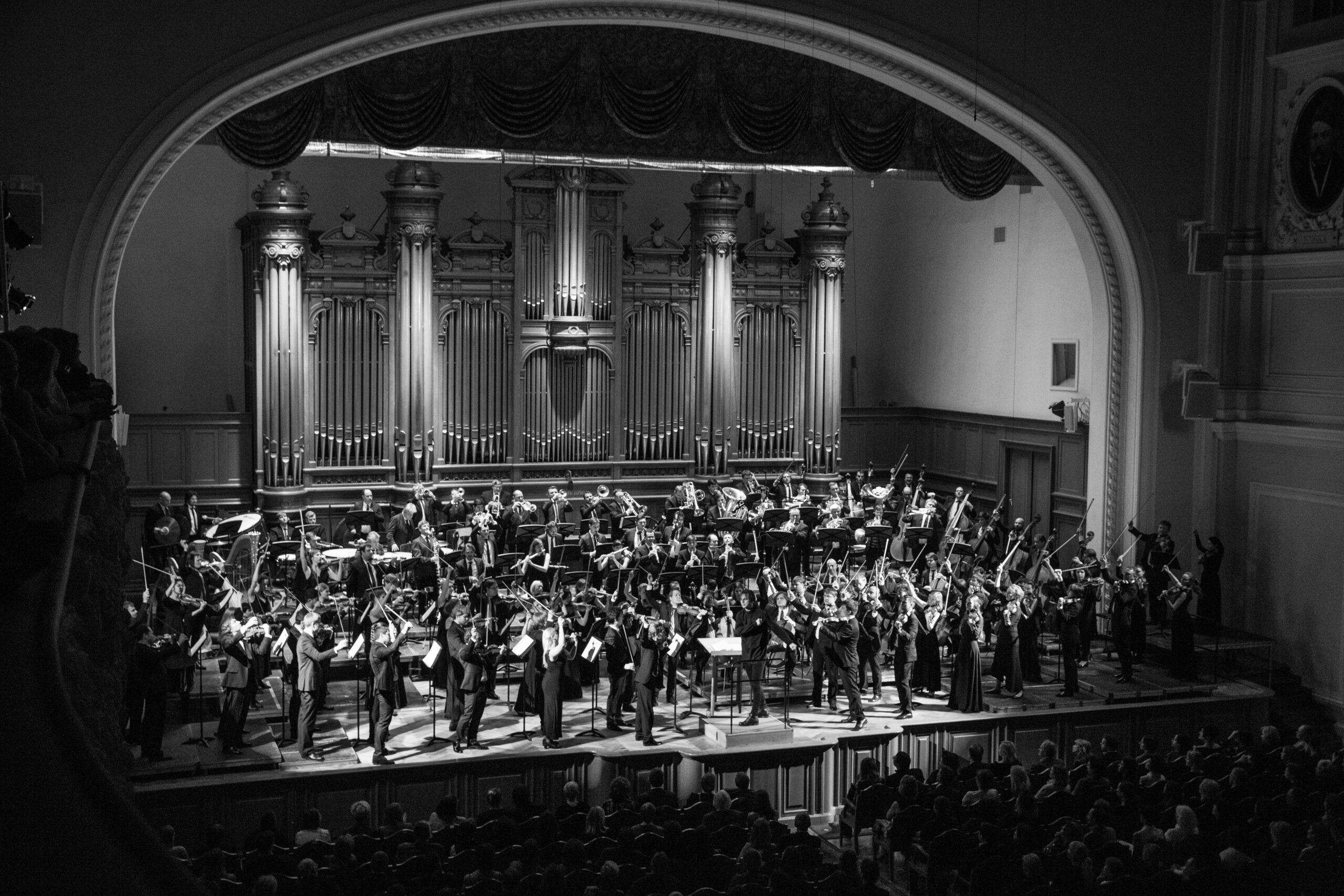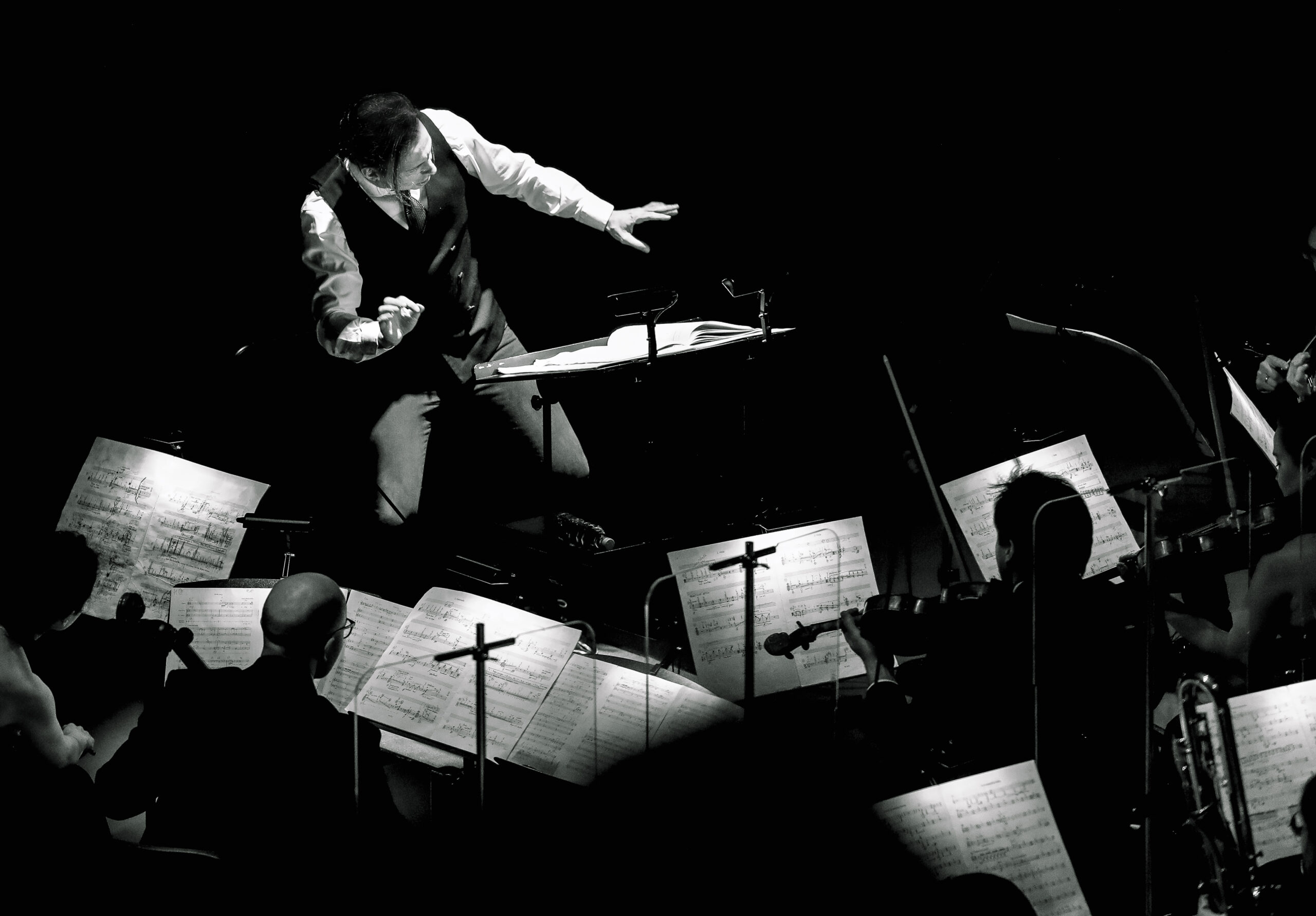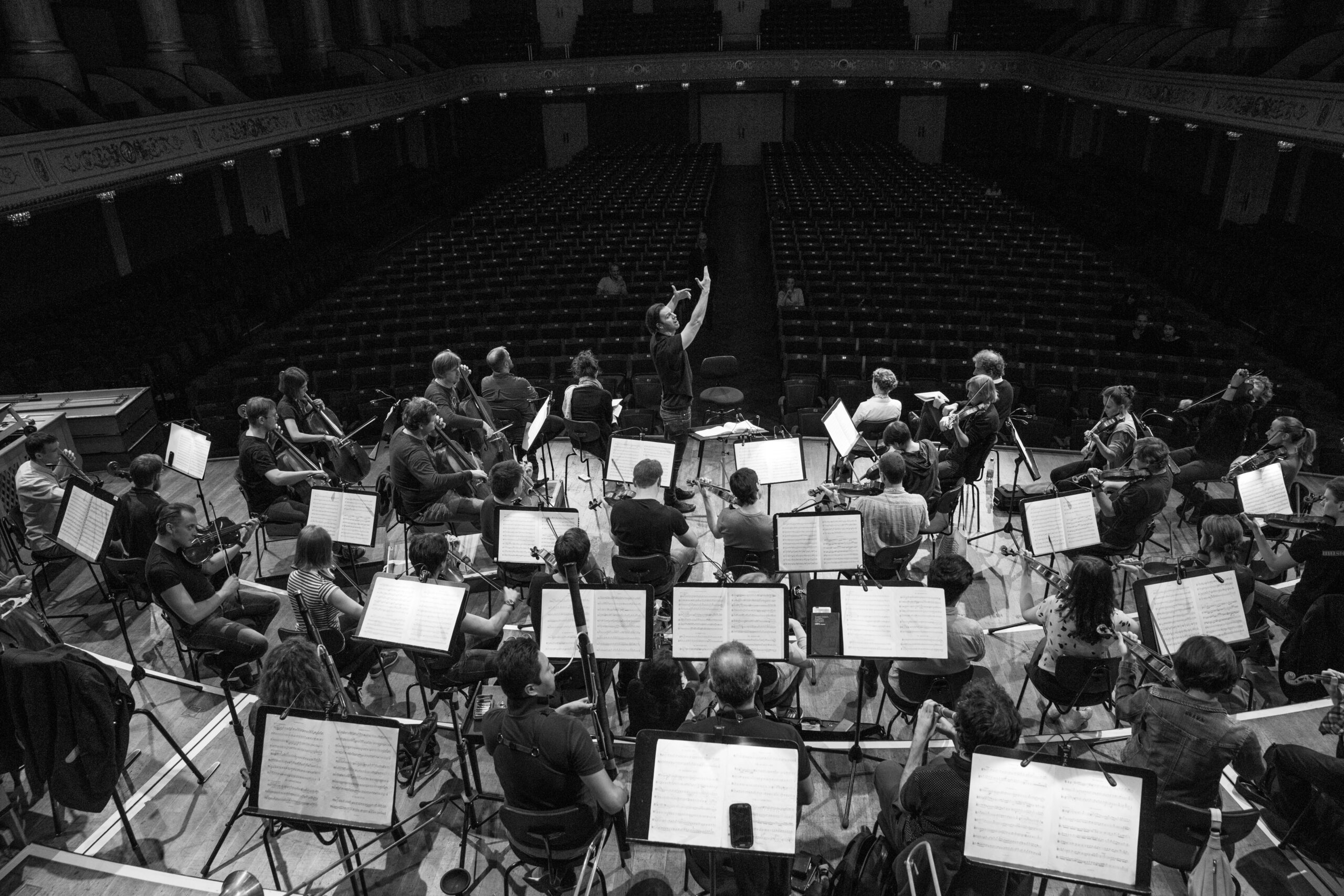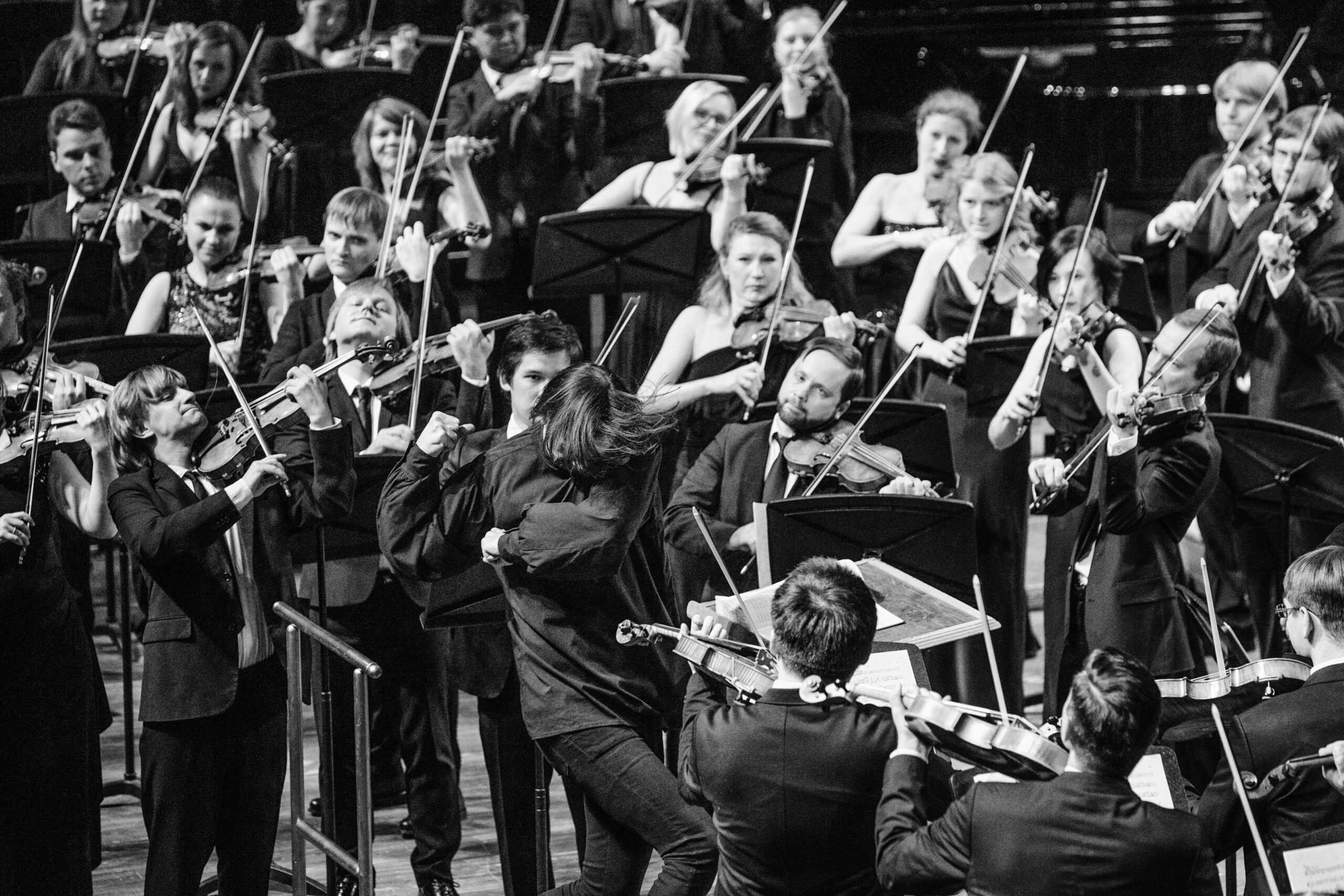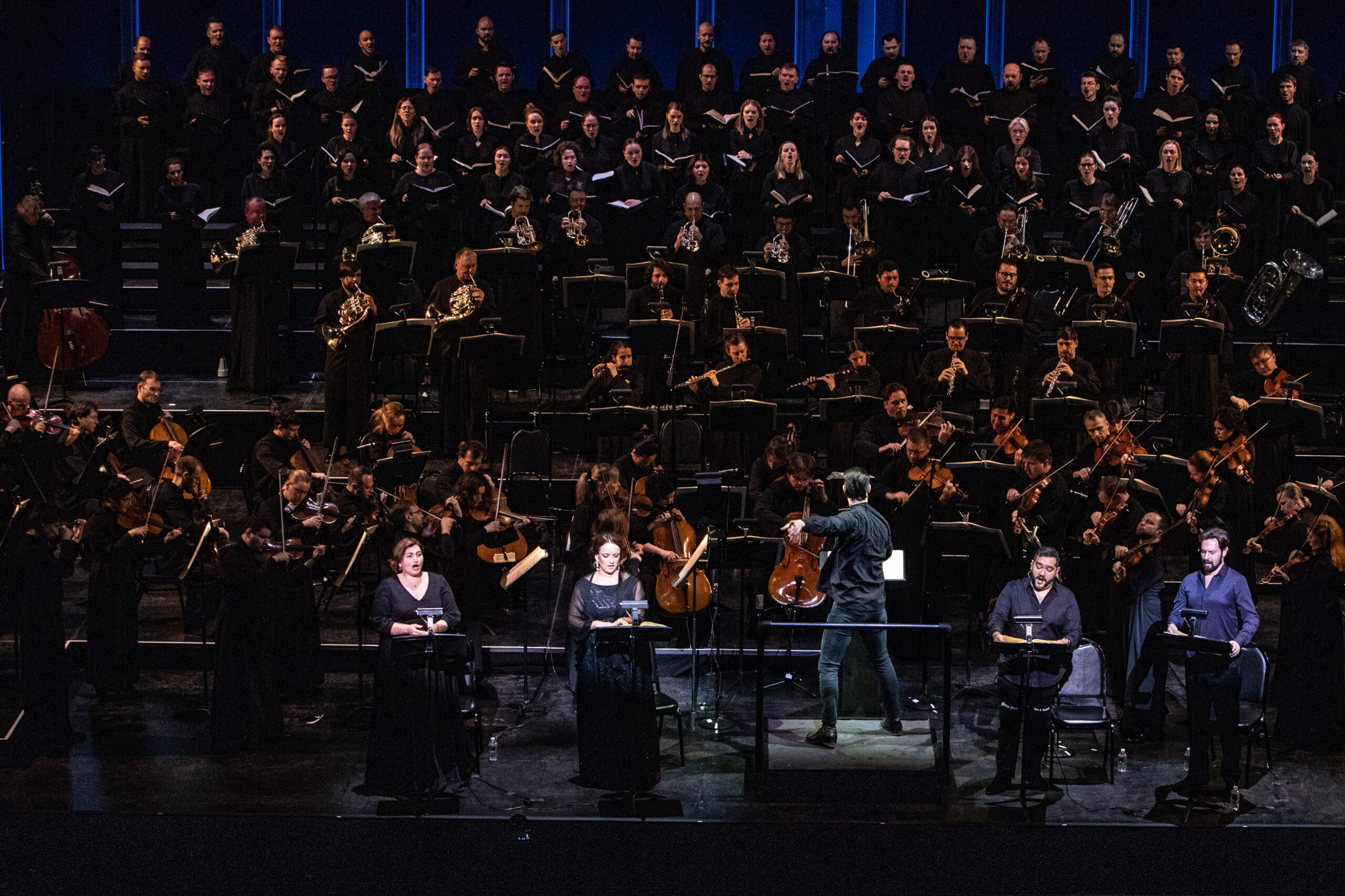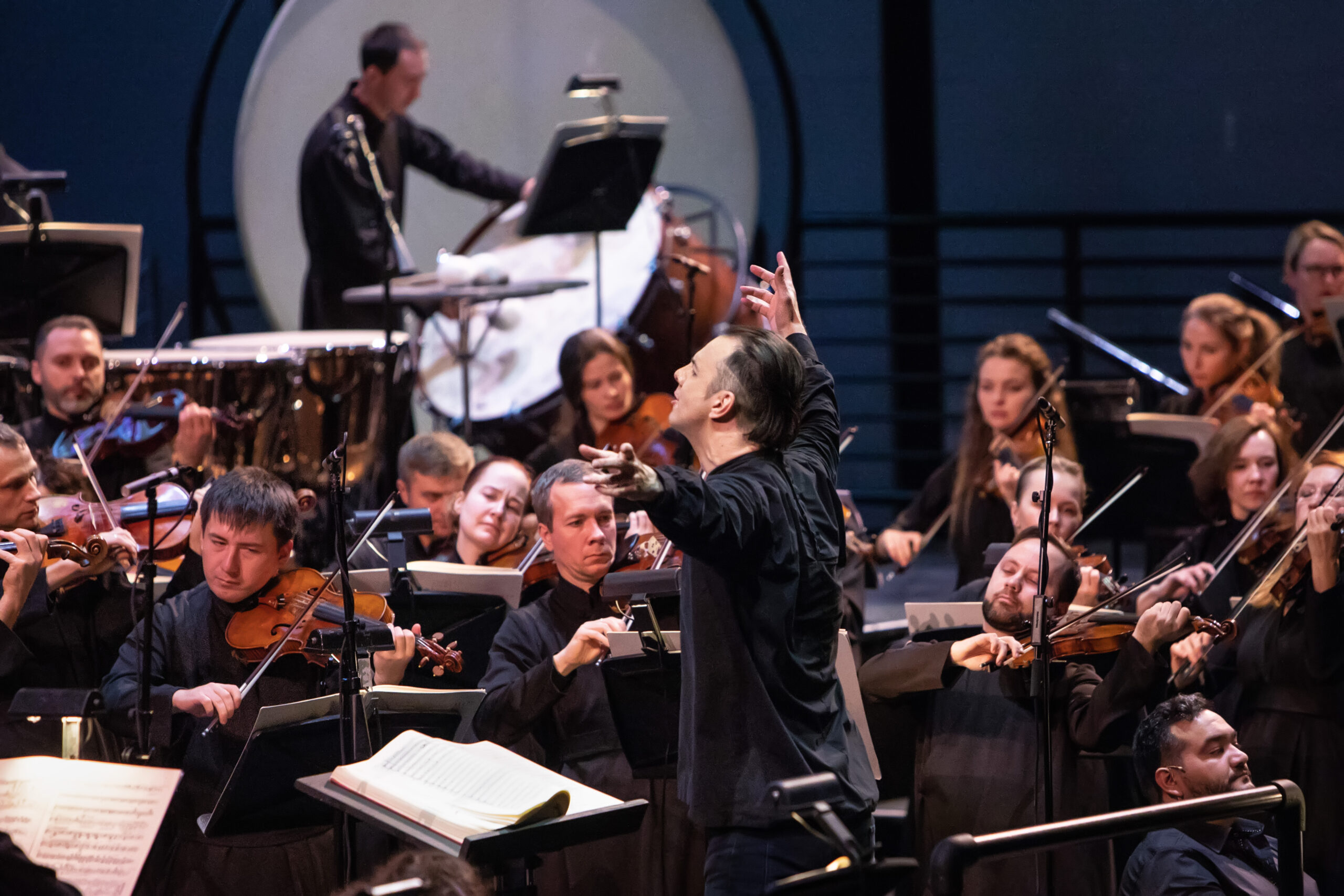musicAeterna is one of the most in-demand Russian ensembles that is constantly pushing the boundaries of its creative capabilities in the field of historically informed performance of early music, academic music of the classical period, and contemporary compositions.
Together with Teodor Currentzis, musicAeterna regularly tours Europe and the world with performances in numerous prestigious venues including Vienna Konzerthaus, Berlin Philharmonic, Elbphilharmonie Hamburg, Munich Philharmonic, Philharmonie de Paris, Kölner Philharmonie, Auditorio Nacional, Baden-Baden Festspielhaus, and La Scala.
The musicAeterna orchestra is a frequent guest at international festivals, such as RUHRtriennale, Klara Festival, Aix-en-Provence festival, Lucerne festival, and Diaghilev festival. In 2017, musicAeterna became the first Russian ensemble to have the honor of opening the main programme of the world’s most prestigious music festival: the Salzburg festival. The musicians performed Mozart’s “La Clemenza di Tito”, directed by Peter Sellars. Since then, musicAeterna has been regularly featured at the festival.
Conducted by Teodor Currentzis, musicAeterna has recorded with Sony Classical the works by Mozart, Mahler, Beethoven, Tchaikovsky, Rameau, and Stravinsky. These recordings have received prestigious music awards: ECHO Klassik, Edison Klassiek, Japanese Record Academy Award, and BBC Music Magazine’s Opera Award.

Olga Volkova
Born in Vladivostok, at the age of seven she gave her first violin recital, and at ten she made her debut on stage with a symphony orchestra. She graduated from the Central Music School of the Moscow State Tchaikovsky Conservatory (Irina Bochkova's class), the Cologne University of Music (Zakhar Bron's and Barnabás Kelemen's classes), studied at the Queen Elizabeth Music Chapel in Brussels (Augustin Dumay's class). In 2016 she became the youngest concertmaster of the Mariinsky Orchestra. Since 2021 she has been the first concertmaster of the Mikhailovsky Theatre Orchestra. In September 2022 she became concertmaster of the musicAeterna Orchestra.
First Violins
Second Violins
Violаs
Cellos
Double Basses
Flutes
Oboes
Clarinets
Bassoons
Horns
Trumpets
Trombones
Tuba
Percussion
Harp
Keyboards
musicAeterna orchestra events
Pyotr Tchaikovsky (1840–1893)
Francesca da Rimini,
Symphonic Fantasy after Dante, Op. 32 (1876)
Capriccio Italien
on folk tunes for orchestra, Op. 45 (1880)
Romeo and Juliet,
Overture-Fantasy after Shakespeare, TH 42 (1869–1880)
musicAeterna Orchestra
Conductor — Teodor Currentzis
Richard Wagner (1813 – 1883)
Vorspiel to the opera Parsifal (1882)
Overture to the opera Tannhäuser (1843–1845)
Vorspiel und Liebestod from the opera Tristan und Isolde (1857–1859)
Vorspiel to the opera Lohengrin (1845–1848)
Overture to the opera Die Meistersinger von Nürnberg (1868)
musicAeterna Orchestra
Conductor Teodor Currentzis
Antonín Dvořák (1841–1904)
Cello Concerto in B Minor, Op. 104, B. 191 (1894–1895)
Allegro
Adagio ma non troppo
Finale. Allegro moderato
Symphony No. 8 in G Major, Op. 88, B. 163 (1889)
Allegro con brio
Adagio
Allegretto grazioso — Molto Vivace
Allegro ma non troppo
The musicAeterna Orchestra
Soloist Alexey Zhilin
Conductor Alexander Sladkovsky
Jean-Philippe Rameau (1683–1764)
The thunderstorm scene from Act II of the opera-ballet Platée ou Junon jalouse (1745)
Act IV, Scene 4: Entry of the muse Polyhymnia from the lyrical tragedy Abaris ou les Boreades (1763)
Tambourines I, II from the prologue to the lyrical tragedy Dardanus (1739)
Antonio Lotti (1667–1740)
Crucifixus a 8 voci from Credo in F Major (before 1717)
Antonio Vivaldi (1678–1741)
Concerto for Cello and Strings in C Minor, RV 401 (late 1720s)
- Allegro non molto
- Adagio
- Allegro ma non molto
The soloist Rabbani Aldangor
George Frideric Handel (1685–1759)
Ombra mai fu (There was never a shadow), aria of Xerxes from Act I of the opera Xerxes, HWV 40 (1738)
The soloist Andrey Nemzer, countertenor
Furie terribili! (Terrible Furies!), aria of Armida from Act I of the opera Rinaldo, HWV 7a (1711/1731)
The soloist Elizaveta Sveshnikova, soprano
Piangerò la sorte mia (I will mourn my fate), aria of Cleopatra from Act III of the opera Julius Caesar, HWV 17, (1724)
The soloist Elizaveta Sveshnikova, soprano
Venti, turbini (Winds, whirlwinds), aria of Rinaldo from Act I of the opera Rinaldo, HWV 7a (1711/1731)
The soloist Andrey Nemzer, countertenor
Johann Sebastian Bach (1685–1750)
Komm, Jesu, komm (Come, Jesus, come), motet for double choir in G minor, BWV 229 (before 1731–1732)
Lobet den Herrn, alle Heiden (Praise the Lord, all ye nations), motet for four-voice choir, dubbing instruments and basso continuo in C major, BWV 230 (n.d.)
Erbarme dich, mein Gott (Have mercy, my God), aria of the alto No. 39 (47) from the sacred oratorio St Matthew Passion, BWV 244 (1727–1729/1736)
Soloists:
Andrey Nemzer, countertenor
Vladislav Pesin, violin
George Frideric Handel
Lascia la spina, cogli la rosa (Leave the thorn, pluck the rose), aria of Pleasure from Act II of the oratorio The Triumph of Time and Disillusion, HWV 46a (1707)
Soloists:
Elizaveta Sveshnikova, soprano
Andrey Nemzer, countertenor
Jean-Philippe Rameau
Les Sauvages/Forêts paisibles (The Savages/Peaceful Forests) from Act IV of the opera-ballet The Gallant Indies, (1725/1736)
Duration: 60 minutes
Jean-Philippe Rameau (1683–1764)
The thunderstorm scene from Act II of the opera-ballet Platée ou Junon jalouse (1745)
Act IV, Scene 4: Entry of the muse Polyhymnia from the lyrical tragedy Abaris ou les Boreades (1763)
Tambourines I, II from the prologue to the lyrical tragedy Dardanus (1739)
Antonio Lotti (1667–1740)
Crucifixus a 8 voci from Credo in F Major (before 1717)
Antonio Vivaldi (1678–1741)
Concerto for Cello and Strings in C Minor, RV 401 (late 1720s)
- Allegro non molto
- Adagio
- Allegro ma non molto
The soloist Rabbani Aldangor
George Frideric Handel (1685–1759)
Ombra mai fu (There was never a shadow), aria of Xerxes from Act I of the opera Xerxes, HWV 40 (1738)
The soloist Andrey Nemzer, countertenor
Furie terribili! (Terrible Furies!), aria of Armida from Act I of the opera Rinaldo, HWV 7a (1711/1731)
The soloist Elizaveta Sveshnikova, soprano
Piangerò la sorte mia (I will mourn my fate), aria of Cleopatra from Act III of the opera Julius Caesar, HWV 17, (1724)
The soloist Elizaveta Sveshnikova, soprano
Venti, turbini (Winds, whirlwinds), aria of Rinaldo from Act I of the opera Rinaldo, HWV 7a (1711/1731)
The soloist Andrey Nemzer, countertenor
Johann Sebastian Bach (1685–1750)
Komm, Jesu, komm (Come, Jesus, come), motet for double choir in G minor, BWV 229 (before 1731–1732)
Lobet den Herrn, alle Heiden (Praise the Lord, all ye nations), motet for four-voice choir, dubbing instruments and basso continuo in C major, BWV 230 (n.d.)
Erbarme dich, mein Gott (Have mercy, my God), aria of the alto No. 39 (47) from the sacred oratorio St Matthew Passion, BWV 244 (1727–1729/1736)
Soloists:
Andrey Nemzer, countertenor
Vladislav Pesin, violin
George Frideric Handel
Lascia la spina, cogli la rosa (Leave the thorn, pluck the rose), aria of Pleasure from Act II of the oratorio The Triumph of Time and Disillusion, HWV 46a (1707)
Soloists:
Elizaveta Sveshnikova, soprano
Andrey Nemzer, countertenor
Jean-Philippe Rameau
Les Sauvages/Forêts paisibles (The Savages/Peaceful Forests) from Act IV of the opera-ballet The Gallant Indies, (1725/1736)
Duration: 60 minutes
Johann Sebastian Bach (1685–1750)
The St Matthew Passion
a sacred oratorio for solo voices, double choir and double orchestra with libretto by Picander (Christian Friedrich Henrici), BWV 244 (1727–1729/1736)
MusicAeterna Choir and Orchestra
Guest soloists
Conductor Teodor Currentzis
